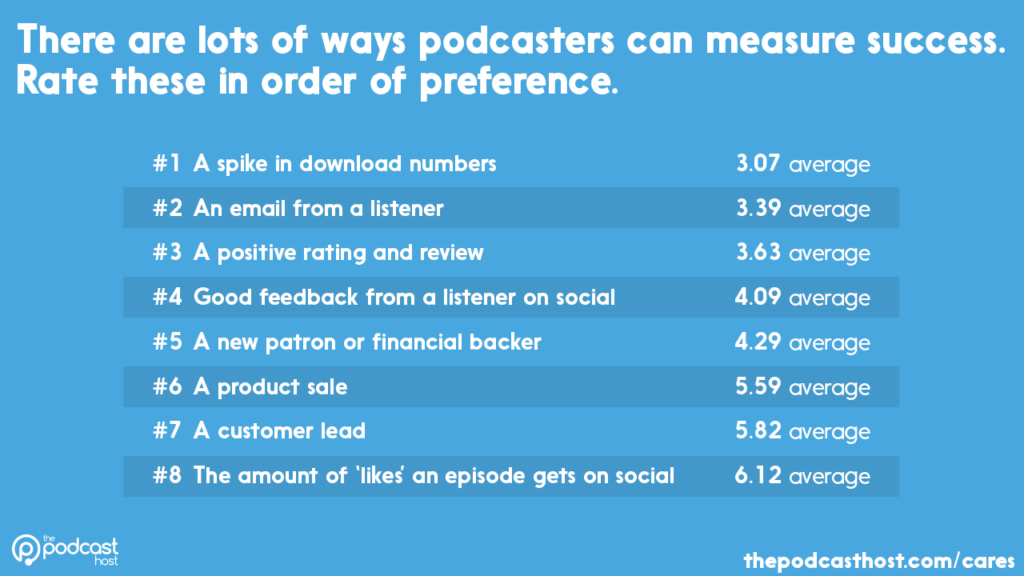Podcast Success: What is It, Does It Matter & How Do You Evaluate It?

Podcast success is a BIG topic among podcasters of all levels.
Rarely a day goes by in an online podcasting group somewhere where someone doesn’t post “My podcast has X downloads, we started X [months/weeks/episodes] ago, is this good?”
That first time you try to benchmark success factors is practically a rite of passage in podcasting. Responses range from “you’re doing great” and “wow, how did you do that” to “if you get even one person to listen you’re doing a great job” and “podcasting takes time to grow.”
Obviously, as a podcaster, you want to hear the former. But, even if you do, it doesn’t really answer your question:
How good is good enough?
What should I be aiming for??
AM I SUCCESSFUL, DAMNIT?!?
The truth is, no one answers your question because no one really knows what makes a podcast successful. Or, more accurately, no one can agree.
What Actually is Success?
Let’s all pull out our fancy little dictionaries – and by that I mean Google or whatever dictionary app you have on your phone – and take a look at what the word “success” means. Defined (by Google), success is “the accomplishment of an aim or purpose.” Which doesn’t tell us anything either. And, that’s the point.
Success is an abstract concept. It’s both relative and subjective, and the only person who can really judge it is you.
Whether or not your podcast is successful depends on what you originally set out to accomplish. Did you simply want to start a podcast (check, success!) or were you aiming to bring in a truckload of cash (it’s on its way, they just don’t know where to park).
This is why setting goals right off the bat is important!
Most goal planning experts recommend that you make SMART goals. These are goals that are:
- Specific
- Measureable
- Achievable
- Realistic
- Time-based
These make evaluating your success (or lack thereof) considerably easier since you have actual data points to go by.
For example: if you set out to make a million dollars in your first year of podcasting and you haven’t, by definition, you have not been successful. Likewise, if you set out on a mission to interview Tom Hanks on your podcast, and your name isn’t Connor Ratliff, you’re probably not there yet.

Does “Success” Really Matter?
Pragmatically speaking, no one really wants to do something unsuccessfully. If you’re going to put the effort into podcasting, you want it to go somewhere. And you’re not alone.
We did a fancy little survey to see what podcasters actually care about. A whopping 69% of respondents — reporting that they “somewhat agreed,” “mostly agreed” or “strongly agreed” — said that the end result of podcasting and not the process itself was the point.
Which leads me to draw the conclusion that success in podcasting does, in fact, matter.
So, How Do We Measure It?
I probably don’t need to reiterate again that there isn’t a single factor that can determine whether or not your podcast is a success. There isn’t a magic number, a bar to hit, or an arbitrary body of podcasters that sends you an award when you get to a specific point.
However, there are a few success factors that you can take a look at. Viewed in combination with each other, they can give you a picture of what your show looks like:
1. How Many People Hear You
Download (or listen) numbers is where most podcasters head to first. Considering a podcast is an audio-based content that gets streamed or downloaded, looking at the numbers makes sense.
In most cases, you want to look at the first 30 days of each new episode as a litmus test on how your show is doing growth-wise. Ideally, this number will go up over time — the higher the better.
But there are a number of factors that can influence an individual episode. For example, the topic, guest, or even marketing effort you put in can change things. It’s also worth pointing out that while podcast metrics have been getting better over the years, they’re not perfect.
Not all platforms have the same criteria for what counts as a listen. Likewise, obtaining the data from third-party sources has historically been challenging. Your best bet is to look at the numbers provided by your host. They can (theoretically) count the amount of times that your RSS feed was accessed.
However, not all hosts provide reliable information (I’m lookin’ at you SoundCloud) and even they have previously had issues getting data from platforms like Apple Podcasts. You can access data from individual players (like Apple Podcasts and Spotify). But it’s just as easy to use your host numbers with the understanding that they might not be exact.
2. The Wads of Cash You’re Pulling In
Look, not every podcaster is out there to make money (and there’s nothing wrong with that). However, if you are someone who aims too and does, it can be a success indicator.
As with other business financial evaluations, you’ll want to take a look at the profit (not revenue) of your show. That is the amount of money you bring in from all sources minus anything you spend to make that happen (like your hosting expenses).
It’s great to know your revenue, but it doesn’t all go back into your pocket. If your expenses are exceeding the revenue you’re bringing in you’ll have a negative profit. As far as success goes, that’s not where you want to be.
3. Reviews and Critiques
My least favourite (but still somewhat valid) method of evaluating success is through reviews and critiques. While you could effectively argue that there is merit in calculating the number and reviewing the contents of your reviews and critiques, I’m not sure they’re an actual success factor.
Why am I not a big fan of them? There are three primary reasons:
- People are more likely to review something when they feel negatively about it
- You can totally tip the scales if you get your grandmother and her entire knitting club to throw you Apple Podcast reviews
- There’s no real basis for what makes a critic a professional critic. I run a movie blog (granted it mostly talks about my love of Tom Hanks movies), does that make me an expert? I think not.
There is a place and time for reviews and critiques (if you want to look at them — it’s certainly not mandatory). But, don’t base your entire view of success on them.
4. Traffic and Leads
If your podcast is set up to promote something beyond the show itself, then traffic and leads could be good success factors.
Again, this isn’t a great method for every podcast out there. If you don’t have a website, landing page or social media profile that you can evaluate, or if you don’t gather leads, this won’t work for you. But if you’re running a show to promote your business, it might be a good idea to check it out.
5. Engagement
Engagement varies from podcast-to-podcast, and its definition is fluid.
It can include anything from how many emails you get to comments on your latest social media posts. Engagement can be more valuable than simple numbers. It shows not only that people are listening, but they enjoy it enough that they want to connect with you.
This is also a great metric to tell prospective sponsors. It can often indicate your influence (because listeners are more likely to make purchases).
6. Listen Notes Score
Listen Notes — a podcast search engine — provides a number called the Listen Score. It essentially determines how popular a podcast is based on its own determination.
Normally, I wouldn’t include something like this in success factors, since it’s a tad bit vague how they calculate it. According to their website they use:
“a mathematical model to calculate a Listen Score for each podcast, based on the 1st party data (e.g., activities on our website) and 3rd party data (e.g., media mentions, reviews…)”
Which is a highly vague and non-descriptive explanation.
However, there is some value to this number considering many sponsors and advertisers use it to determine what podcasts they’re interested in working with. This number certainly isn’t the be all-end all, but it can help benchmark your show against others.

So, How Do I Measure My Podcast’s Success?
While all of these indicators are interesting, it’s not a great idea to cling to one as your sole indicator of success. Your best bet is going to be taking a look at all of them as a whole to evaluate your show.
There are some some interesting benchmark numbers published by Buzzsprout that might give you a better idea of how your show stacks up against the rest. The 7-day numbers for new episodes seem to be a good starting point when evaluating the health of a podcast. According to them, getting:
- 26 downloads puts you in the top 50% of podcasts
- 231 downloads gets you in the top 10%
- 3,062 downloads gets you into the top 3%
However, it’s important to note that not all podcasts should be evaluated as a whole. A podcast operating in a small niche that gets 1,000 downloads per episode could be wildly successful. It’s really all based on context.
When it boils down to it, it’s up to you to make the determination on whether or not you’re seeing success with your show. You can look at every factor and compare yourself to every show out there, and you’re not guaranteed to get a true picture.
Podcasting and not sure what you’re doing? Honestly, none of us are. But if you want a leg up, check out the Podcast Host Academy where you can find real actional advice and guidance (that thankfully isn’t written by yours truly). Whether you’re starting out or just need a little refresher, there’s something for you there.
